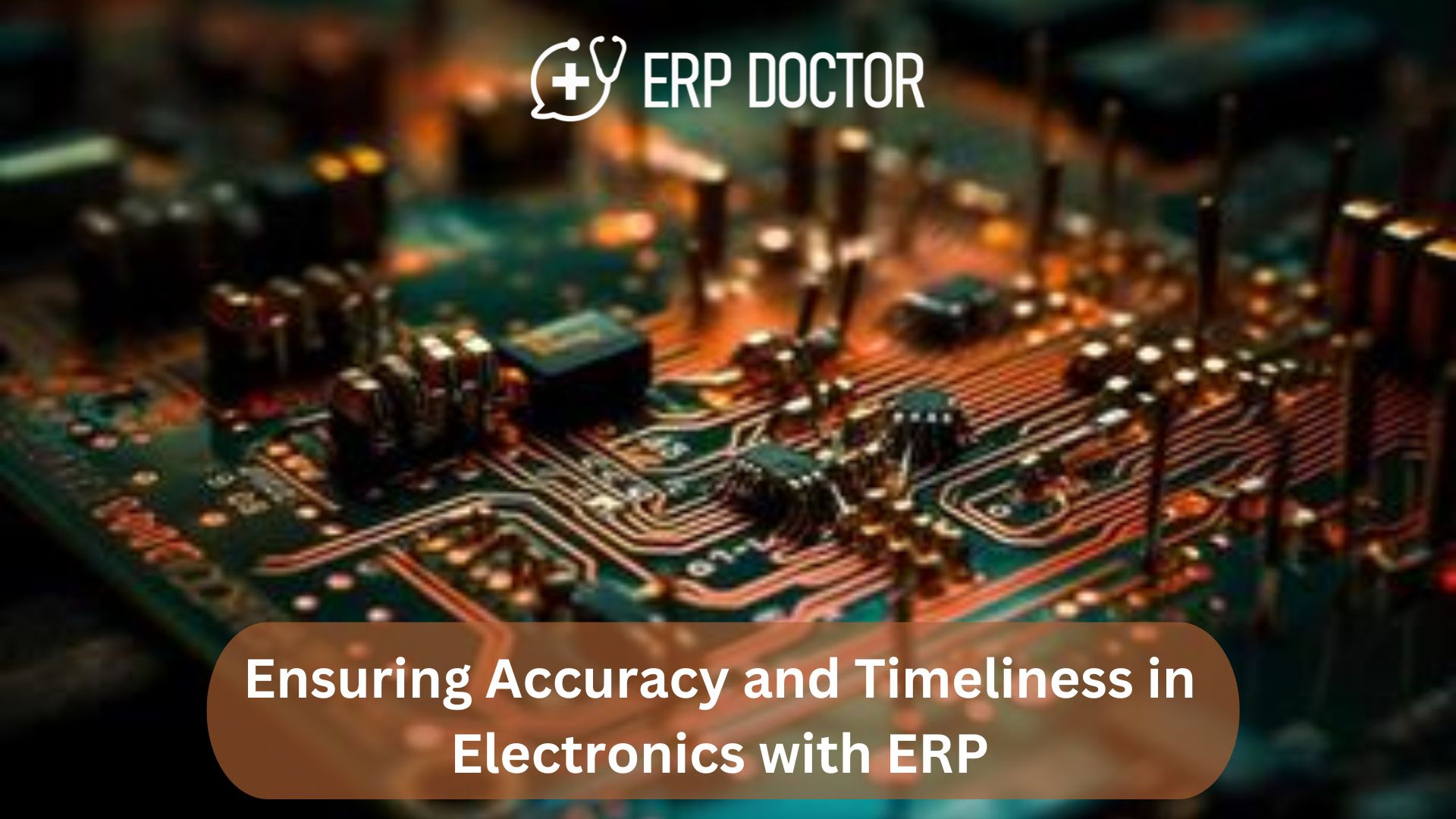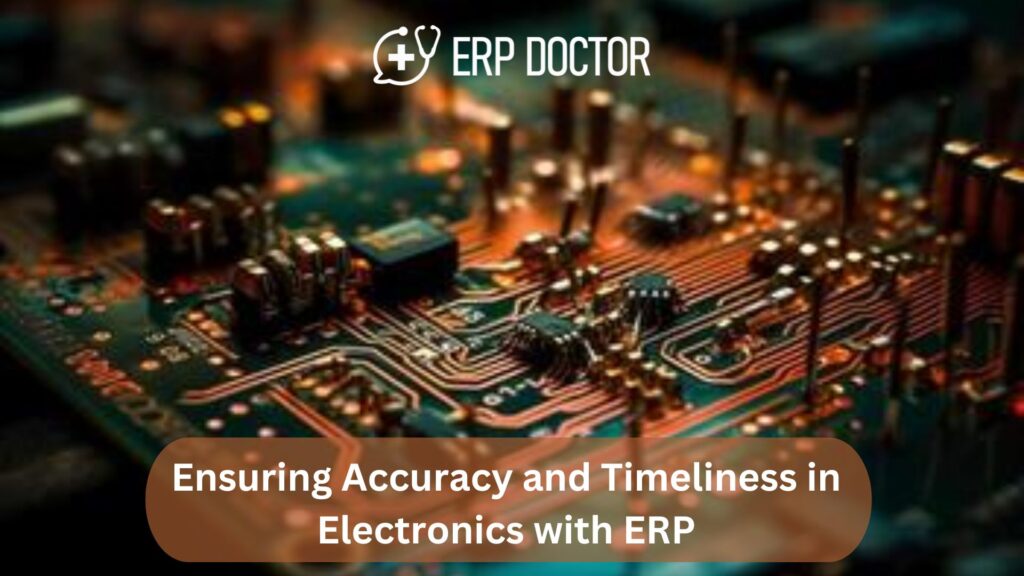
Ensuring Accuracy and Timeliness in Electronics with ERP

Streamlining Electronics Manufacturing with ERP Tools
In the highly competitive electronics industry, businesses face challenges like managing complex supply chains, reducing production lead times, and ensuring high accuracy in every step of operations. From sourcing raw materials to delivering finished products, every stage demands precision and timely execution. This is where ERP tools (Enterprise Resource Planning) play a pivotal role. ERP solutions streamline operations, automate processes, and enhance visibility across the value chain, ensuring accuracy and timeliness in production and delivery. we will explore how ERP tools transform electronics businesses, driving efficiency, accuracy, and customer satisfaction.
Understanding ERP Tools for the Electronics Industry
ERP tools integrate all key business processes into a single, centralized system. These processes include supply chain management, production planning, inventory control, quality assurance, and delivery tracking. With modules tailored for the electronics industry, ERP systems help manufacturers handle large volumes of data, ensure timely production, and maintain product accuracy.
For an industry dealing with short product lifecycles, tight schedules, and global demand, ERP becomes a critical tool to align operations and resources efficiently.
Key Features of ERP Tools for Electronics:
- Real-time Data Access: Track production progress, inventory levels, and delivery timelines in real-time.
- Inventory Management: Optimize inventory to prevent shortages or overstocking.
- Quality Control Modules: Ensure product compliance with industry standards.
- Automated Scheduling: Align production processes with customer deadlines.
- Supply Chain Optimization: Streamline procurement and logistics.
Improving Accuracy with ERP Tools
Accuracy is crucial in electronics manufacturing. A single error can lead to defective products, costly recalls, and damaged brand reputation. ERP tools ensure accuracy at every stage, from design and production to quality control and delivery.
Real-Time Data for Informed Decisions
ERP systems provide real-time insights into production and inventory data. Managers can monitor processes and spot inconsistencies instantly, enabling them to take corrective actions before errors escalate.
For example:
- Automated BOM (Bill of Materials) ensures accurate component usage during production.
- Real-time monitoring reduces manual data entry errors.
Precision in Quality Management
ERP tools offer built-in quality control modules to enforce product standards and compliance. They monitor processes like:
- Raw material inspections
- Production checkpoints
- Final product testing
With accurate quality checks, businesses can reduce defects, ensuring the final product meets customer expectations.
Error-Free Inventory Management
ERP systems use inventory tracking tools to maintain precise stock levels. Barcode scanning, IoT-enabled devices, and automated workflows ensure that businesses always have the right components available without over-purchasing or understocking.
Example: A business can set minimum stock alerts, reducing the risk of missing components during critical production runs.
Ensuring Timeliness with ERP Tools
The electronics industry operates under strict deadlines. Timely delivery is critical to maintaining relationships with distributors, retailers, and end customers. ERP tools automate scheduling, streamline workflows, and optimize supply chain processes to deliver products on time.
Production Planning and Scheduling
ERP systems help manufacturers create efficient production schedules based on order priorities, resource availability, and delivery deadlines. This eliminates delays caused by bottlenecks or inefficient task allocation.
For example:
- Automated production schedules prioritize urgent orders.
- Real-time production updates allow businesses to adjust schedules as needed.
Supply Chain Visibility
ERP tools integrate supply chain management, providing end-to-end visibility into procurement, inventory, and logistics. Businesses can monitor supplier performance, reduce lead times, and ensure timely deliveries.
Key benefits:
- Track supplier shipments to avoid raw material delays.
- Optimize logistics to meet delivery deadlines.
On-Time Delivery through Automation
Automating processes like order processing, inventory checks, and dispatch scheduling ensures businesses meet customer expectations without delays.
For instance:
- Orders are automatically verified against available inventory.
- Dispatch schedules align with production completion times.
Result: Faster order fulfillment, improved customer satisfaction, and repeat business.
Benefits of ERP for the Electronics Industry
ERP tools offer several advantages to electronics manufacturers, including:
- Increased Operational Efficiency: Automation reduces manual tasks and streamlines operations, leading to better productivity.
- Improved Accuracy: Real-time data minimizes human errors and ensures precise inventory and production tracking.
- Timely Deliveries: Optimized workflows and supply chain processes enable businesses to deliver products on time.
- Enhanced Customer Satisfaction: Accuracy and timeliness improve customer trust, loyalty, and satisfaction.
- Cost Reduction: By minimizing delays, errors, and overstocking, ERP tools reduce operational costs.
ERP Implementation Success in Electronics
Company Overview: A mid-sized electronics manufacturer faced challenges like inaccurate inventory data, missed production deadlines, and rising operational costs.
Problem:
- Frequent inventory mismatches led to delays in sourcing raw materials.
- Manual production scheduling caused bottlenecks.
- Quality control issues resulted in product recalls.
Solution: The company implemented an ERP system with integrated modules for inventory management, production scheduling, and quality assurance.
Results:
- 99% inventory accuracy with automated tracking.
- 30% improvement in on-time deliveries through efficient scheduling.
- Significant reduction in defects with automated quality checkpoints.
By leveraging ERP tools, the company transformed its operations, delivering products faster and maintaining high quality.
Choosing the Right ERP Tool for Your Electronics Business
To ensure accuracy and timeliness, businesses must choose an ERP solution that aligns with their operational needs. When selecting an ERP system, consider the following factors:
- Industry-Specific Features: Ensure the ERP tool offers modules designed for electronics manufacturing, such as BOM management and quality control.
- Scalability: Choose a solution that can grow with your business.
- User-Friendly Interface: Simplify adoption with intuitive dashboards and workflows.
- Real-Time Analytics: Access accurate, real-time data for informed decision-making.
- Integration Capabilities: Ensure seamless integration with existing tools, such as IoT devices and warehouse systems.
Popular ERP solutions like SAP Business One, Oracle NetSuite, and Microsoft Dynamics 365 offer industry-specific features tailored for electronics manufacturers.
The Power of ERP in Electronics
In today’s fast-paced electronics industry, accuracy and timeliness are critical for success. ERP tools provide businesses with the capabilities to streamline operations, automate processes, and reduce errors. From managing complex production schedules to ensuring precise quality control, ERP solutions empower manufacturers to deliver exceptional products on time, every time.
By implementing the right ERP system, electronics businesses can improve operational efficiency, reduce costs, and gain a competitive edge in the market.
Ready to transform your electronics operations? Explore tailored ERP solutions to achieve accuracy, efficiency, and timely deliveries. Contact us today for a free consultation!
Want to speak to an expert? Fill in the form below, and we will be in touch with you shortly!







